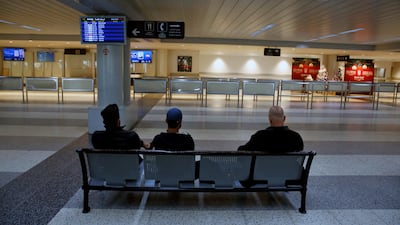Lebanese air-traffic controllers at Rafic Hariri International Airport have announced that they will go on strike starting September 5 in protest at severe staff shortages.
They said they will work shorter shifts from 7am to 8pm, meaning night flights might be suspended. Beirut airport currently operates 24/7.
“These schedules are commensurate with our current number and take into account the safety of movement until the implementation of the necessary reforms in the Air Navigation Authority to restore work at the airport 24 hours a day in a safe and sound manner”, according to a statement by the workers.
The announcement follows a report last week by European Union Aviation Safety Agency (EASA) and International Civil Aviation Organisation (ICAO) that highlighted concerning findings revealed by The National.
The report highlighted various “systemic deficiencies” after an aviation safety team inspected the airport in June. The visit aimed to prepare for next year's audit, identifying potential weaknesses for rectification.
The report stressed it was of “crucial importance” for the Lebanese civil aviation authorities to enable the “recruitment and retention of appropriately qualified and experienced” air-traffic controllers as “a matter of utmost urgency”.
An air-traffic controller guides the plane from taxiing to take-off and landing, ensuring safe separation between planes and efficient routes, by providing instructions to the aircraft. It is a highly regulated profession due to its extremely stressful nature.
The air-traffic controllers' statement “warn of the severe shortage” stressing that there are only 13 traffic controllers left. Standard regulations would require 87, according to a source from the Lebanese Civil Aviation Department.
The air-traffic controllers indicated that their proposals to tackle the issue have been consistently disregarded by successive governments, which have dismissed their safety concerns over the years.
These suggestions, included among other things, training assistant controllers – who are working without certification – and recruiting new staff.
“We are tired and exhausted as a result of working according to inhumane schedules, which are unacceptable neither in Lebanon nor internationally”, they said in the statement.
They added that they work around 300 hours per month, and with a majority of staff above 50 years old, this becomes a “serious threat to air traffic safety”.
Fadi Elhassan, the director general of civil aviation, told The National that “no flights will be suspended”.
“Our airport will stay operational 24/7, there is no official adoption from the air-traffic controllers about the statement which was disseminated”, he added.
He did not specify which guarantees will be given to halt the controllers' strike – if any.
The Directorate General of Civil Aviation previously said that they were working in close co-ordination ICAO to address the air-traffic controller shortage to formulate “a robust training and certification programme that will augment our controllers with skilled professionals in the near future”.
Mr Elhassan did not comment on the specifics of the training, the number of ATC positions under consideration, ICAO's role, or when it would be enacted.


